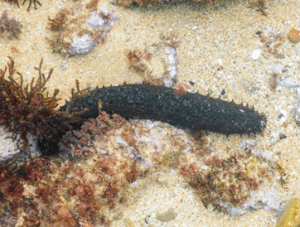TAG: GS 3: ECOLOGY AND ENVIRONMENT
THE CONTEXT: A new research suggests that sea cucumber’s repopulation could play an important role in protecting and revitalizing another type of endangered marine organism: corals.
EXPLANATION:
- Coral reefs, which support approximately 25% of marine biodiversity, are in a state of rapid decline due to a combination of factors, including ocean warming, pollution, and overfishing.
- Among the many strategies being considered to aid in their recovery, one unlikely candidate has emerged: sea cucumbers.
- These scavengers of the seafloor, long valued as a delicacy in Asia, may play a crucial role in protecting and revitalizing coral reefs.
- Coral reefs are critical to marine ecosystems and human economies.
- They provide habitat and shelter for a wide variety of marine organisms, contribute to food security for millions of people, support tourism industries, and protect coastal areas from storm surges.
- The decline of coral reefs, therefore, poses a significant threat to both marine biodiversity and human communities.
Sea Cucumbers: Nature’s Janitors
- Sea cucumbers, which resemble their vegetable namesake, are effective scavengers of the seafloor.
- They consume bacteria and decaying organic matter, effectively “cleaning” the sediment and converting waste into sea cucumber body mass.
- This process reduces the amount of organic “food” available for harmful microbes, thereby potentially lowering the incidence of diseases that afflict coral reefs.
- In field experiments conducted in Moorea, French Polynesia, and around Palmyra Atoll, researchers, including Cody Clements and myself, observed the impact of sea cucumbers on coral health.
- By manipulating the presence of sea cucumbers in specific areas and comparing the health of corals with and without sea cucumbers, the study found that corals near sea cucumbers were significantly less likely to become diseased and die.
 Sea cucumber
Sea cucumber
Methodology of the Study
- Two main experimental approaches were employed:
- Sediment Removal Experiment: Sea cucumbers were removed from certain sand patches, while others were left undisturbed.
- Cage Experiment: Corals were placed in cages with and without sea cucumbers to observe the direct impact of sea cucumber presence on coral health.
- Both methods demonstrated that sea cucumbers play a vital role in preventing the spread of pathogens by consuming bacteria and decaying organic matter.
The Impact of Overharvesting
- Sea cucumbers have been overharvested for centuries, particularly in recent decades, leading to a significant decline in their populations.
- This overharvesting has likely exacerbated the decline of coral reefs by removing these natural “janitors” from the ecosystem.
- The comparison can be made to neglecting to clean a cluttered room, which quickly becomes unhealthy—this is analogous to the current state of many coral reefs.
Coral Reef Decline
- The decline of coral reefs is multifaceted.
- Ocean warming, driven by climate change, leads to coral bleaching and increased susceptibility to disease.
- Overfishing removes fish species that are crucial for coral health.
- Pollution, particularly nutrient-rich runoff, fosters the growth of harmful microbes.
- The decline in sea cucumber populations adds to these stresses by allowing harmful bacteria and organic material to accumulate on the seafloor.
Benefits of Repopulating Sea Cucumbers
- Reintroducing and repopulating sea cucumbers could provide several benefits:
- Disease Reduction: By consuming bacteria and organic matter, sea cucumbers can reduce the incidence of diseases that affect corals.
- Improved Water Quality: Their scavenging activities can enhance the overall health of the reef environment.
- Ecosystem Stability: Repopulating sea cucumbers can contribute to the stabilization of reef ecosystems, buying time for nations to implement broader measures to combat ocean warming, overfishing, and pollution.
Corals
- Coral reefs are vital ecosystems built by coral polyps, which have a symbiotic relationship with zooxanthellae algae.
- When water temperatures rise, corals expel these algae, leading to bleaching—a phenomenon where corals lose their vibrant colors and eventually die.
- Ocean acidification exacerbates bleaching by reducing calcium mineral availability for coral exoskeletons.
- Types of coral reefs in India:
- Fringing reefs
- Fringing reefs evolve and develop near the continent and remain close to the coastline.
- These reefs are separated from the coastline by small, shallow lagoons.
- They are the most commonly found reefs in the world.
- Barrier reefs
- Barrier reefs are found offshore on the continental shelf.
- They usually run parallel to the coastline at some distance.
- A deep and wide lagoon is located between the coastline and the barrier reef.
- Atolls
- Atolls are formed on mid-oceanic ridges.
- They are shaped circularly or elliptically and are surrounded by seas on all four sides and have shallow waters in the center called a lagoon.
- All the three major reef types occur in India. The mainland coast of India has two widely separated areas containing reefs: the Gulf of Kachchh in the northwest, which has some of the most northerly reefs in the world, and Palk Bay and Gulf of Mannar in the southeast.
- In addition to these, there are patches of reef growth on the West Coast, for example, coral reefs at Malvan.
- The Andaman and Nicobar Islands have fringing reefs around many islands, and a long barrier reef (329 km) on the west coast.
- Little is known about these reefs, which may be the most diverse and pristine reefs in India. The Lakshadweep also has extensive reefs but these are also poorly explored.
- Global warming has resulted in widespread coral bleaching events, causing significant damage to coral reefs worldwide.
- The loss of coral reefs has severe repercussions for coastal communities, including those inhabiting coral islands like Lakshadweep, who rely on these ecosystems for livelihoods and protection from rising sea levels.
- Fringing reefs




